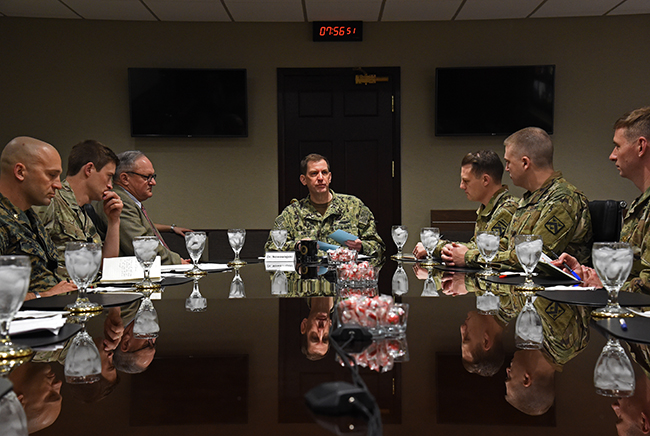
Navy Vice Adm. David Kriete, US Strategic Command deputy commander, welcomes Army Command and General Staff College Art of War Scholars to USSTRATCOM Headquarters at Offutt AFB, Neb., on April 16, 2019. Air Force photo by SSgt. Ian Hoachlander.
A top US official who oversees strategic forces is concerned about growing uncertainty in nuclear arms control, as America’s withdrawal from a major Cold War-era treaty took effect Aug. 2.
After reviewing the Intermediate-Range Nuclear Forces Treaty in 2017, the Trump administration announced last year it would pull out of the agreement. The US began the six-month process of withdrawing from the pact in February.
Without the INF safeguards in place to prohibit the use of certain types of weapons, US Strategic Command must "continue to understand and stay ahead of and adjust as needed in the face of changing threats," Vice Adm. Dave Kriete, STRATCOM’s deputy commander, told reporters during a July 31 roundtable.
“The world is changing, different countries that may become adversaries at different points in the future, they have different cultures, different outlooks, different long-term objectives, and if we aim to deter them effectively, we have to understand what they are and then be able to adjust,” he said.
Another challenge lies in keeping nuclear forces modernization on track, he continued. The Pentagon has several replacement and refurbishment programs underway for its aging bombs, missiles, aircraft, and submarines.
“We’ve been able to continue to operate them, and operate them safely, securely, and effectively, so that we know that they will work when we want them to, as advertised,” Kriete said. “But that can’t last forever.”
The US and Soviet Union signed the INF Treaty in 1987 to ban all land-based ballistic and cruise missiles, nuclear or conventional, that can strike targets between 500 and 5,500 kilometers away. But that cooperation has soured as the US argues Russia is no longer acting in good faith.
“The United States will not remain party to a treaty that is deliberately violated by Russia,” the State Department said in an Aug. 2 release. “Russia’s noncompliance under the treaty jeopardizes US supreme interests as Russia’s development and fielding of a treaty-violating missile system represents a direct threat to the United States and our allies and partners.”
In response, the US is designing a conventional ground-launched cruise missile and a ballistic missile to counter Russian weapons. Deployment of the weapons—but not research, development, or testing—was prohibited by the treaty. Air- and sea-launched cruise missiles were allowed under the pact.
“What we’ve been working on over the past several months is some research and development work for what could become a non-INF-compliant weapon system, should we get to this point, so we’ve postured ourselves for this possibility that we may find ourselves in a point in the near future where we’re not obligated by the INF Treaty,” Kriete said. “That’s just prudent military planning.”
The Trump administration envisions moving to an arms-control framework that encompasses Russia and China and “moves beyond the bilateral treaties of the past,” according to the State Department.
“The United States greatly appreciates the steadfast cooperation and resolve NATO allies have shown in responding to Russia’s violation,” the State Department said. “The United States remains committed to effective arms control that advances US, allied, and partner security; is verifiable and enforceable; and includes partners that comply responsibly with their obligations.”
The New START Treaty, which has limited the number of nuclear assets the US and Russia have at the ready since 2011, is also set to expire in early 2021 with the possibility of a five-year extension.
“I can’t tell you which path we’re going to find ourselves on come February 2021,” Kriete said. “From a STRATCOM perspective, we like the idea of arms control agreements, particularly with Russia, that provide us some level of assurance that there are at least a portion of their nuclear forces that are capped, so we know what we have, what we’re dealing with, and then we can plan accordingly.”
If the US finds itself in a position where it can no longer verify how many nuclear weapons Russia owns or what capabilities they wield, Kriete said STRATCOM would have to find new ways to get that information.
“Those verifications give us a confidence level that the other side is actually complying with the treaty, which is also really, really important,” he said.
Kriete added the US would benefit from an agreement that limits new weapons and delivery systems Russia has continued to develop that New START doesn’t cap.